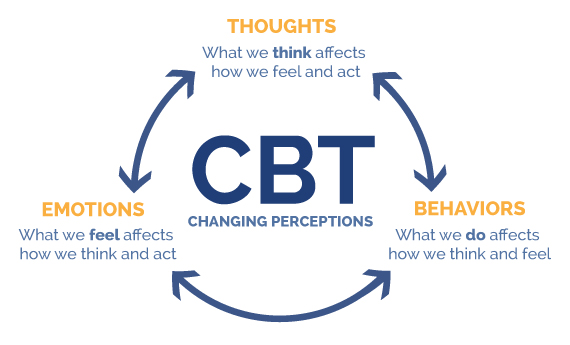Cost-effective and flexible counselling for anxiety options available
Cost-effective and flexible counselling for anxiety options available
Blog Article
Checking Out Different Techniques in Coaching for Anxiety Condition for Long-term Change
When dealing with anxiousness problems, it's necessary to discover a variety of therapy methods. Each approach offers distinct understandings and devices to aid you manage your signs and symptoms efficiently. You may discover that integrating techniques can yield the ideal results. Understanding the nuances of these methods is key to promoting lasting modification. What if the right mix could launch a brand-new degree of emotional wellness for you?
Understanding Stress And Anxiety Conditions: A Short Review
Anxiety disorders, which affect numerous people worldwide, can considerably affect daily life. You might experience overwhelming feelings of anxiety or fret that appear uncontrollable. These sensations can lead to physical signs like an auto racing heart, sweating, or also lightheadedness. Usual sorts of anxiousness problems consist of generalized stress and anxiety disorder, panic attack, and social anxiety disorder. Each has distinct indicators, however they all share a propensity to interrupt your routine and relationships.Understanding the origin triggers of your stress and anxiety is crucial. It might originate from genetics, brain chemistry, or life experiences. Recognizing your triggers can help you handle your responses much better. It is very important to bear in mind that you're not the only one in this struggle. Many individuals face comparable difficulties, and seeking aid is a strong step towards feeling much better. By learning more about stress and anxiety conditions, you're currently on the path to understanding and managing your condition better.
Cognitive-Behavioral Treatment: Challenging Negative Idea Patterns
In Cognitive-Behavioral Therapy, you'll start by determining the unfavorable idea sets off that add to your stress and anxiety. Once you recognize these ideas, you'll work on replacing them with more favorable choices. Together, you'll build reliable coping strategies to aid manage your stress and anxiety in daily circumstances.
Recognizing Negative Thought Triggers

Recognizing the specific triggers behind your negative thoughts can be essential in handling anxiousness when you run into minutes of distress. Begin by taking notice of circumstances that provoke sensations of fear or anxiety. Is it a jampacked area, a forthcoming target date, or a discussion with specific individuals? Write these circumstances in a journal. This will certainly assist you recognize patterns in your reasoning. Additionally, notification physical feelings that accompany your negative ideas, like an auto racing heart or rigidity in your chest. By identifying these triggers, you gain understanding into what's sustaining your anxiousness. Comprehending these connections is the initial action in challenging those thoughts and inevitably reclaiming control over your emotional feedbacks.
Replacing Ideas With Positives
Testing unfavorable idea patterns is a vital action in transforming your attitude and minimizing anxiety. You might frequently locate on your own caught in cycles of insecurity or disastrous reasoning. Rather than letting these thoughts dictate your sensations, practice replacing them with favorable affirmations or practical alternatives. When you believe, "I can not manage this," shift it to, "I can manage difficulties one step at a time." This basic adjustment can significantly influence your emotion. On a regular basis determining and responding to these adverse ideas aids develop a much healthier internal dialogue. Keep in mind, it takes some time and effort, however continually exercising this strategy can bring about long-term change, empowering you to face anxiety with renewed confidence and resilience.
Structure Coping Approaches Together
Replacing adverse thoughts is just the start of handling stress and anxiety efficiently. To create long lasting modification, you need to build coping strategies that empower you. Cognitive-Behavioral Therapy (CBT) helps you identify and test those purposeless idea patterns. Together, you and your counselor can discover just how these thoughts impact your feelings and behaviors.Start by developing sensible strategies, like journaling or mindfulness workouts, that permit you to face stress and anxiety head-on. When you face your anxieties progressively, you'll discover to react in a different way.

Mindfulness and Acceptance-Based Approaches: Growing Present-Moment Understanding
As you browse the complexities of stress and anxiety, including mindfulness and acceptance-based strategies can significantly enhance your ability to cultivate present-moment recognition. By focusing on the present moment, you'll locate that you can observe your thoughts and feelings without judgment (Counseling services for anxiety). This technique helps you recognize your stress and anxiety without really feeling overwhelmed by it.Engaging in mindfulness exercises, such as deep breathing, body scans, or assisted reflections, allows you to ground on your own in your existing experience. Acceptance-based techniques motivate you to welcome your emotions instead of fight versus them. They shed their power over you.Incorporating these practices into your everyday regimen can change how you respond to stress and anxiety when you accept your feelings. You'll establish resilience and learn to navigate difficult circumstances with better ease. Ultimately, cultivating present-moment awareness lays the structure for long-term change, empowering you to lead a more meeting life
Direct Exposure Therapy: Confronting Worries Slowly
Exposure therapy assists you challenge your anxieties in a gradual way, making it much less frustrating. You'll learn techniques to deal with anxiety-provoking scenarios detailed, while additionally constructing coping strategies to manage your reactions. This method empowers you to take control and reduce anxiousness over time.
Gradual Direct Exposure Strategies

When encountering stress and anxiety, gradually challenging your concerns can be a powerful means to restore control. This technique, recognized as progressive exposure, entails gradually exposing on your own to the situations or items that trigger your anxiousness. Start with much less intimidating situations and gradually function your way as much as more difficult ones. As an example, if you're terrified of public speaking, you may begin by speaking in front of a mirror, after that progress to sharing ideas with a pal, and at some point deal with a tiny group. Each action aids desensitize you to the worry, developing your confidence over time. Keep in mind, it's vital to speed yourself and commemorate tiny success as you relocate with this process, enhancing your ability to manage stress and anxiety properly.
Building Coping Methods
Structure reliable coping strategies is vital for taking care of stress and anxiety, particularly as you face your worries slowly - Counseling services for anxiety. One effective approach is exposure therapy, where you begin by facing your fears in a controlled manner. Begin with much less daunting scenarios and gradually function your means up to more challenging scenarios. This gradual exposure assists desensitize you to anxiety triggers, making them much less overwhelming.Incorporate relaxation methods, such as deep breathing or mindfulness, to soothe your mind during exposure. Track your progress, commemorating tiny triumphes in the process to boost your confidence. Bear in mind, it's okay to take your time; the objective isn't perfection yet steady enhancement. By building these methods, you'll encourage on your own to navigate anxiety and welcome life a lot more fully
Psychodynamic Treatment: Discovering Origin of Anxiousness
Psychodynamic treatment checks out the subconscious mind, revealing the origin triggers of your stress and anxiety. By analyzing your ideas, feelings, and previous experiences, this technique helps you reveal underlying disputes and unresolved concerns that might contribute to your current anxiousness. You'll deal with a specialist to check out childhood experiences, relationships, and psychological patterns that shape your responses today.As you obtain insight right into these deeper layers of your psyche, you'll begin to recognize exactly how past occasions affect your existing behavior. This understanding can cause catharsis, allowing you to process feelings you might have suppressed.Through the restorative partnership, you can additionally identify defense devices that may have established over time, using a clearer path to change. Ultimately, psychodynamic therapy equips you with the tools to address your anxiety at its core, advertising enduring change in your psychological well-being.
All Natural and integrative Strategies: Integrating Strategies for Greater Efficacy
Integrating different therapeutic strategies can enhance your journey towards taking care of anxiety better. By integrating aspects from cognitive-behavioral treatment, mindfulness techniques, and holistic techniques, you can develop a tailored strategy that resolves your unique needs. For circumstances, you may make use of cognitive-behavioral strategies to challenge negative thought patterns while integrating mindfulness workouts to ground on your own in today moment.Additionally, exploring holistic methods such as yoga or meditation can promote relaxation and minimize anxiousness signs and symptoms. This mix enables you to establish higher self-awareness and resilience.Experimenting with these varied approaches can assist you find what resonates most with you. Keep in mind, it has to do with discovering a harmony that functions, as opposed to sticking to a solitary strategy. This integrative approach not just uses instant alleviation but additionally cultivates long-lasting abilities for managing stress and anxiety, empowering you to recover control over your life.
The Function of Support Systems: Building Durability Through Link
While it may seem that taking care of anxiousness is a solitary trip, having a strong support group can play a vital role in your strength. Surrounding yourself with understanding close friends, family members, or support teams produces a safe room where you can honestly share your feelings and experiences. When you link with others, you remind on your own that you're not alone in this struggle.These relationships use support and can provide practical coping methods that have worked for others. It's also an opportunity to get viewpoint; good friends can aid you see situations in different ways, decreasing sensations of isolation.Moreover, emotional support cultivates a sense of belonging, which can considerably reduce stress and anxiety symptoms. By leaning on your support system, you can build strength and deal with challenges much more properly. Remember, getting to out for help is an indication of toughness, and it can make all the distinction in your trip toward managing anxiousness.
Frequently Asked Questions
What Are the Typical Signs of Anxiousness Conditions?
You may experience uneasyness, exhaustion, trouble concentrating, irritation, muscular tissue stress, and rest disruptions. Physical signs and symptoms can consist of rapid heartbeat, sweating, and trembling. Recognizing these indications early can aid you look for ideal assistance and therapy.
For How Long Does Therapy Usually Last for Stress And Anxiety Conditions?
Treatment for stress and anxiety conditions normally lasts anywhere from a couple of weeks to numerous months. It actually relies on your private requirements, development, and the strategies your specialist utilizes to assist you manage your anxiety effectively.
Can Medication Be Used Alongside Treatment for Stress and anxiety?
Yes, medicine can most definitely be used along with treatment for stress and anxiety. Combining both approaches typically improves treatment effectiveness, helping you take care of signs and symptoms while checking out underlying concerns via counseling (Counseling services for anxiety). Always consult your medical care copyright for personalized advice
Are There Self-Help Approaches for Managing Anxiousness?
Yes, there are numerous self-help approaches for handling anxiousness. You can exercise mindfulness, take part in normal workout, maintain a well balanced diet plan, develop a routine, and utilize deep breathing methods to help in reducing anxiety signs efficiently.
Just how Do I Know if I Need Professional Help for Stress And Anxiety?

Report this page